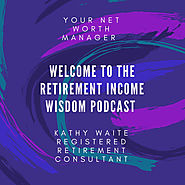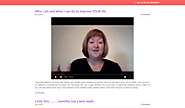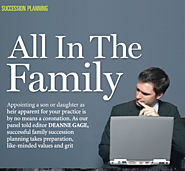-
About
- About Listly
- Community & Support
- Howto
- Chrome Extension
- Bookmarklet
- WordPress Plugin
- Listly Premium
- Privacy
- Terms
- DMCA Copyright
- © 2010-2025 Boomy Labs
 Kathy Waite
Kathy Waite
Listly by Kathy Waite
Kathy Waite Registered Retirement Consultant and fee for service financial planner. Articles my advice has been featured in Globe and Mail, National Post , Money Sense, Wealth Professional, Canadian Family Magazine , Global News, Yahoo Finance, Forum Advocis, and more www.yournwm.ca

THE QUESTION – link to article
— A Money123 reader
“When testing out apps or software to track spending, look for the simplest one you can find that isn’t going to turn into an expensive paid version, works on your go-to device’s operating system (IOS, Windows, Android), so it’s at hand daily and, most importantly, syncs with the bank accounts and credit cards you use to avoid data input becoming wearisome.
I believe in keeping it simple, so I would suggest starting with what I call an anti-budget strategy and then playing around with software when you feel more confident.
Here’s how to get started. Divide expenses into two categories: fixed, non-negotiable and variable, discretionary.
For fixed costs, don’t waste any energy on them; they are what they are. Automate paying them from the account your pension lands in.
For variable expenses, review whether your money is going towards things you care about. Make adjustments. Find your average dollar spend each month. Open a second bank account and on pension payment day, transfer that amount in.
You can see what you have available to spend at a glance, which makes management real-time and proactive instead of looking back at a credit card statement when it’s too late to do anything about it.“
-Kathy Waite, registered retirement consultant, Your Net Worth Manager

Breaking up with your financial advisor can be an emotional and stressful event — almost as traumatic as a romantic break-up. But getting out of the relationship needn’t involve any shouting or tears
“Have some confidence and know your facts. You have rights. No one cares about your money more than you do. You don’t have to apologize for not being happy.”
“There are often more options than people think there are. Don’t just panic and cash out.” says Kathy Waite fee only planner in Saskatchewan

Tax concerns are often an important component of financial planning, affecting areas from portfolio structure to charitable donations or retirement forecasts. But how comprehensive should the tax portion of an advisor’s practice be?
For some advisors, the relationship they’ve built with clients can open the door for broader conversations around tax planning, which can sometimes include taking a deeper dive into their tax returns, often in co-operation with accountants. In some cases, they can even provide a valuable perspective by filling in knowledge gaps or taking an approach that’s more holistic and focused on the long term.
Finding ‘gaps’ in the information
Generally, Kathy Waite, a fee-for-service retirement income specialist and founder of Your Net Worth Manager in Regina, refers to her role as the “middle of the wheel,” focusing on the bigger picture for the client and bringing the accountant into the conversation for input on tax-specific questions.
“We can do some of this buildup and the soft stuff and let [accountants] do the technical [work],” says Ms. Waite. “I actually find I get a really good reception from the accountants. I haven’t had any be awkward or feel like I’m stepping on their toes.”
She also says reviewing the draft of a client’s tax return is a value-added service that can further build the relationship. What she’s checking is not technical – but she occasionally finds gaps in information that the client hasn’t told the accountant.
“I find omissions and it’s because we know people so well, and clients don’t know what the accountant needs to know sometimes,” she says.
“You’ll have clients do things like ask the company they work for to put their bonus into their [registered retirement savings plan (RRSP)] and then the accountant just immediately uses [the contribution for that taxation year].”
In contrast, it would be more efficient if the client used the contribution amount over a couple of years, Ms. Waite adds.
“The accountant’s job is very [much focused on] ‘this year’ and it’s kind of a done deal, it’s reactive,” she says.
“My job is to be more proactive, and so when they prepare that return, I’m looking through it thinking about the future – ‘If we do that this year, what does it look like down the road?’”

Many older women who left the banking to their husbands are overwhelmed by the complexities of managing their retirement nest eggs
Kathy Waite, a fee-only financial planner in the Regina area, says not only are women like this easy prey for fraudsters but they are also sitting ducks for financial professionals who wish to push their own products on them, even with the best intentions.
She says the best advice for women who find themselves at sea with their finances after the loss of a partner is to just do nothing for a while.
“I always tell them not to rush into any changes,” says Ms. Waite, who runs Your Net Worth Manager, a financial planning service with clients across Saskatchewan and, by remote, across Canada. “I always encourage them to ask questions and to get any answers in writing. At the risk of sound self-serving, I would say, go look for someone who doesn’t sell things – someone who will just charge you for the advice and doesn’t have a vested interest in selling a product.”
She advises women to bring a friend – not necessarily a family member – to any financial meetings. She says often professionals will decide that “mom isn’t coping” and turn their focus to the relative.
Ms. Waite says it is easier for women to break finances into smaller goal-oriented chunks, such as living debt free and leaving money for children, rather than swimming against a tide of jargon, including term insurance, TFSAs, RRIFs, debt securities and annuities.

Don’t wait until you’re gone to leave your wealth to family and charity. Give while you’re alive and reap the benefits in hugs, gratitude—and lower taxes.
The key is not to use gifting as a means to control your children—like telling them the gift depends on the fact that they buy a home near yours. If you put too many conditions on the gift, it can end badly. “Have a good conversation about it,” says Kathy Waite, the financial planner. “One client of mine gifted her daughter $15,000 to be used to purchase a home. The daughter used $10,000 towards the down payment and $5,000 for furniture. The parents didn’t like that at all but I reminded them that the reason they gave the gift was to release stress for the new home owners and the gift did do that.”

Kathy Waite, Retirement Income Specialist, based in Saskatchewan but with clients across Canada and in the USA shares 30 years of wisdom, lessons from the school of hard knocks and her observations on the sins of the financial services industry with you.

David has an entrepreneur’s instincts ... in business and in investing. Annie prefers low-risk mutual funds and a safe future for the family
Their financial plan has allowed them both to feel comfortable. Annie is less nervous about the future and is happy a portion of their cash flow is directed toward David’s business investments. "Tension over investments has visibly disappeared at their meetings" said Mrs. Waite.
“Now that everything else is covered off, Annie kind of sits back in the chair and she looks at him as he gets into talking about his investments. She enjoys watching him being enthusiastic because she feels safe.”

Read 'Can 50/50 finances work in a marriage?' from our blog Pay Day on Yahoo Finance Canada . Bills can be a headache at the best of times. Figuring out who pays for what in a relationship can be complicated enough to trigger a migraine. Should you split bills evenly in your marriage or partnership?
Fifty/fifty isn’t usually sustainable as incomes differ, and over a lifetime one partner usually takes time off to raise children, care for elderly relatives, or may be on sick leave for a period,” says Kathy Waite, net worth manager at Your Managers Group of Companies. “Fifty/fifty is a roommate, not a marriage.”
To avoid future disagreements, Waite suggests handling joint expenses systematically.
“It’s really important to write down what you agree [to],” Waite says. “Email it to each other, use a spreadsheet saved in a joint Dropbox or OneDrive, or write it in a notebook so there are no arguments later.
“Set up automatic transfers,” she adds. “Use phone apps and tools like Mint and FreshBooks …to track progress.”

This financial advisor reveals to WP everything from what she feels is the real problem with the financial advice i - Wealth Professional Magazine

Financial professionals can help clients who go down the internet rabbit holeIn Ms. Waite’s experience, clients who research products or investment strategies overzealously can fall victim to confirmation bias. “They keep Googling things and reading things that justify their idea,” she says.
Ms. Waite calls her fee-only status “liberating.” She says it gives her more credibility with clients when discussing the pros and cons of a particular investment product.
Her more than 30 years of experience in financial services also helps her determine whether clients are truly listening to her advice or already have their minds made up. She has taken some training in how to do an even better job in getting her “plans before products” message across.
The internet isn’t the only place that clients turn to for information that may not be in their best interests. Ms. Waite describes a soon-to-be retired client with a low-risk investment portfolio. This client asked whether she could emulate the approach of her high-earning doctor brother and get his 19 per cent annual return.
She agreed to run the numbers of the brother’s investment approach, applying it, hypothetically, to up to 10 per cent of the client’s portfolio. The focus remained on the end goal. As it turned out, this new approach wouldn’t make any real difference to the client’s retirement, but would introduce some risk. The client looked at Ms. Waite and said, “Why would I do it? I am just setting myself up for a lot of gray hair and stress.”

Kathy Waite, financial detective, retirement designer and money ninja . Interviewed about her career and why she runs her business the way she does as a fee for service planner. Not representing a company just her clients, even though it attracts the ire of main stream financial advisors.
She says : " I keep busy , I have a wait list , theres about 50 like me in Canada and most only take very high net worth . I don't discriminate, compared to 80,000 who are paid to sell you things clients love that I work for them, i sit on their side of the table"

Kathy Waite fee only financial planner, money coach, financial detective , money ninja
How I solve your problems and get you where you want to be

Kathy Waite said: We have a family work ethic in common, and we take promises very seriously. It’s a real privilege to work with my son. I feel very lucky. You get to know them in a way you would- n’t normally.
I deliberately position Ben as an equal who just has a different skill-set. This has worked well with clients because they feel like he knows things I don’t know. It’s [all about] trying to make a succession plan a positive thing. Ben and I split the job between us; I do the financial planning and he does the product implementation, [being] a markets/technical guy.
Appreciate that your goals at your time of life are not the same as your adult child’s coming into the business. Listen to each other. The youngster’s pie-in-the-sky may just be the innovations that keep your business current. Family members tend to talk to each other in a way colleagues wouldn’t. [The best advice is to] treat each other as colleagues and always be professional.

A survey of client attrition rates for 2014 may, in fact, represent a turning point for the industry as it prepares - Wealth Professional Magazine
“There will be a lot of unhappy clients out there once they realized the truth about their accounts and how much fees they’re paying to some of these advisors,” said an advice-only planner with Your Net Worth Manager, Kathy Waite. “I think that we’ll see the attrition rate get much higher when CRM2 finally kicks in.”
“Typically I don’t lose clients unless they die.”
Till death do us part – not enough advisors are thinking that way, Waite said.

Advisors-turned-mortgage brokers expect more will follow their lead, leaving CRM2 change behind. - Wealth Professional Magazine
“We’ll probably see (that scale of loss) and there’s no reason for it,” Kathy Waite, Saskatchewan told WP. “What’s this going to do to the economy? All of those people being beat out of the business and it’s illogical for them to make such a decision without fully assessing the impact.”

Human emotions are great if you’re looking for love. But, they may not be beneficial when making major financial decisions. One emerging market says it’s taking emotion out of the equation.
Kathy Waite, an independent financial advisor based out of Saskatchewan, said she agrees removing human emotion is good, but isn’t sure robo-advisors do that.
“I think if anything it could be too clinical,” she said. “I think if people could be dispassionate then robo-advisors could be a good thing but I don’t know how could there be hand-holding in the bad times.”
Waite sees human emotion as the very roadblock that will prevent robo-advising from reaching a sizeable percentage of the population.
“I think that money is a very personal thing, and not many people will actually be comfortable with just dealing with someone on the telephone,” she said

This inevitable discussion about your client's estate and will could actually generate you, the advisor, more busin - Wealth Professional Magazine
Kathy Waite quoted “I think it’s really important because it is part of the bigger picture,’ she says. “If you don’t have that conversation, you are really failing them (clients). People don’t need good news all the time, they need the truth.”

Advisors react to actions taken by a Vancouver advisor - who successfully sued CIBC for wrongful dismissal. - Wealth Professional Magazine
Quoting Kathy Waite Regina Saskatchewan Your Net Worth Manager
My initial reaction is that a client’s money should never be mixed with your own personal affairs,” says Saskatchewan-based, fee-only advisor, Kathy Waite. “There is no way an advisor should be holding a client’s money. It’s a disaster waiting to happen.”

The kids grow up, we realise our whole lives have been about organising them! Heres how I found a hobby for myself and learned to ride at 40. Now 50 i am slightly less terrified and having fun with it. Keeping 4 lovely horses on our acreage it gives myself and my husband a common interest and keeps me fit shovelling and hauling hay. https://lizsumner.com/get-back-on-a-horse/

One WP reader is suggesting more government regulation would ease the sales-first approach and improve industry pro - Wealth Professional Magazine
Kathy Waite :“I think the government should directly regulate insurance and investment sales people. Having to be sponsored by a product provider for a life license is a joke,” she wrote.
“Immediately you get a target and are expected to sell your sponsor's products first.”

The province's finance minister was in Toronto Thursday making his proposal for a national body to handle enforceme - Wealth Professional Magazine
Kathy Waite, a net-worth manager, based out of Saskatchewan – who emigrated from England 10 years ago – feels there’s another issue at hand – what Canada’s regulatory bodies pay attention to. In her opinion, there should be a shift in focus.
“Here they regulate the product, there (in England) they regulate the advice,” she says. “(In England), I had to prove what I was doing was the right thing for the client, whereas here you just have to do a ‘Know Your Client’ form … As long as the products are suitable, that’s fine.”
Presently, Canada is the only major industrialized country without a single securities regulator.

A Saskatchewan fee-only advisor suggests there are situations where recommending back-end funds to clients is warra - Wealth Professional Magazine
“I now work as a fee only but prior to 2011 I sold DSC after discussion with my clients. There is absolutely nothing wrong in selling DSC funds to clients if the advisor has done a proper assessment and analysis of the client's specific needs,” Waite commented on WP. “And has made the client aware of exit fees and they have an emergency fund so they do not cash in.”
Another problem beyond DSC exit fees is the very concept of emergency funds. Most people get confused about what actually constitutes an emergency.
For that reason she has a two-tiered system where the client sets up a “life happens fund” for those times where things such as your side mirror getting knocked off your car in the grocery store parking lot. For actual emergencies such as losing your job and income for six months she gets them to keep room on their lines of credit combined with some sort of GIC laddering.
And lastly, regardless of fund fees, Waite has an important piece of advice for clients of all types.
“I always say to people if you need the funds in the next 3-5 years, don’t put it in the stock market,” she said.

New research is pointing to just how much work the industry has ahead of it in addressing a concern that continues - Wealth Professional Magazine
Speaking to Wealth Professional, Kathy Waite, who describes herself as an unbiased fee-only financial planner, operating as Your Net Worth Manager, agrees that consumers are overwhelmed by jargon, perhaps deliberately, and have no idea how to evaluate performance of their accounts to the market.
Waite said that there is an element of bias at play, of course banks would be expected to push their own products, but there is also a more hidden side to the industry concerning 'independent' advisors offering products from mutual fund dealers that have their own products. This means that representatives would be incentivized to sell in-house products, making them less independent.

Registered Retirement Consultant. Your Net Worth Manager Fee Only Financial Planning for regular people in Saskatchewan and across Canada
Retirement designer and money ninja !